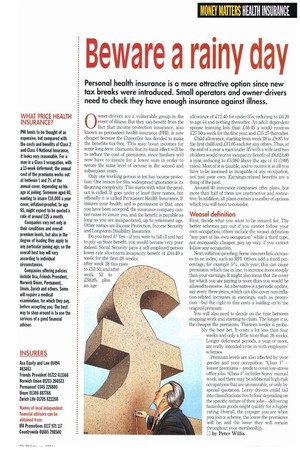Beware a rainy day
Page 21

If you've noticed an error in this article please click here to report it so we can fix it.
Personal health insurance is a more attractive option since new tax breaks were introduced. Small operators and owner-drivers need to check they have enough insurance against illness.
0 wner-drivers are a vulnerable group in the event of illness. But they can benefit from the fact that income protection insurance, also known as permanent health insurance (PHI), is now cheaper because the Chancellor has decided to make the benefits tax-free. This may boost incomes for some long-term claimants, but its main effect will be to reduce the cost of premiums, since hauliers will now have to insure for a lower sum in order to secure the same level of income in the second and subsequent years.
Only one working person in ten has income protection. One reason for this widespread ignorance is its daunting complexity This starts with what the product is called. It goes under at least three names, but officially it is called Permanent Health Insurance. It insures your health, and is permanent in that, once you have been accepted, the insurance company cannot cease to insure you, and the benefit is payable as long as you are incapacitated, up to retirement age. Other names are Income Protection, Income Security and Long-term Disability Insurance.
Do you need it? Yes—if you were to fall ill and had to rely on State benefit, you would become very poor indeed. Social Security pays a self-employed person lower rate short-term incapacity benefit of £44.40 a week for the first 28 weeks; after week 28 this rises to £52.50, and after . . , week 52 to / £58.85, plus an age allowance of £12.40 for under 35s, reducing to .6.20 to age 44 and nothing thereafter. An adult dependent spouse (earning less than £46.45 a week) receives £27.50 a week for the first year, and £35.25 thereafter.
Child allowance, starting from week 28 is £9.85 for the first child and .£11.05 each for any others. Thus, at the end of a year a man under 35 with a wife and two children would receive incapacity benefit of £6,624.80 a year, reducing to £5,980 above the age of 44 (1995 rates). Most of it is taxable, and to receive it at all you have to be assessed as incapable of any occupation, not just your own. Earnings-related benefits are a thing of the past.
Around 40 insurance companies offer plans, but more than half of them are unattractive and restrictive. In addition, all plans contain a number of options which you will need to consider.
Weasel definition
First, decide what you want to be insured for. The better schemes pay out if you cannot follow your own occupation; others include the weasel definition "any part of his own occupation" while a third type, not necessarily cheaper, pay up only if you cannot follow any occupation.
Next, inflation-proofing. Some insurers link increases to an index, such as RPI. Others add a fixed percentage, for example 5%, each year; this can cause premiums, which rise in line, to increase more steeply than your earnings. It might also mean that the cover for which you are paying is more than you would be allowed to receive. An alternative is a periodic update, say every three years, which can also cover non-inflation-related increases in earnings, such as promotion—but the right to this costs a loading on to the original premium.
You will also need to decide on the time between stopping work and starting to claim. The longer it is, the cheaper the premiums. Thirteen weeks is probably the best bet. It costs a lot less than four weeks and only a little more than 26 weeks. Longer deferment periods, a year or more, are really intended to tie in with employers' schemes.
Premium levels are also affected by your gender and your occupation. "Class 1"—
lowest premiums tends to cover low-stress office jobs. "Class 4" includes heavy manual work, and there may be additional high-risk occupations that are uninsurable, or only by special quotation. Lorry drivers could fall into classifications two to four depending on the specific nature of their jobs—delivering hazardous goods might qualify for a higher rating. Overall, the younger you are when you join a scheme, the lower the premiums will be, and the lower they will remain throughout your membership.
0 by Peter Willis




































































































